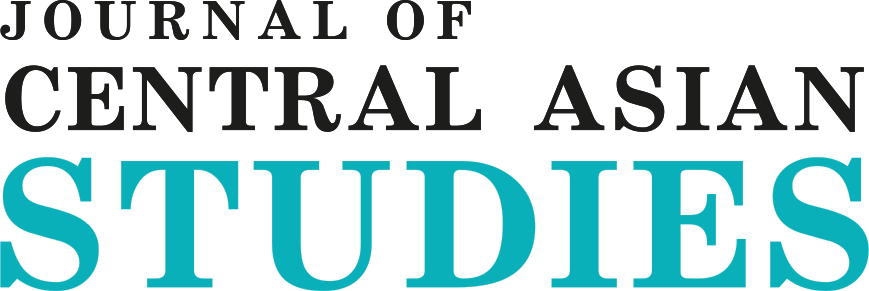Жұмсақ күш дипломатиясы: АҚШ-тың Орталық Азиядағы стратегиясын ілгерілету құралы
DOI:
https://doi.org/10.52536/3006-807X.2025-2.003Кілт сөздер:
жұмсақ күш, білім беру дипломатиясы, академиялық ұтқырлық, басқару, геосаяси ықпалАңдатпа
Америка Құрама Штаттары академиялық ынтымақтастықты жұмсақ күш құралы және демократиялық құндылықтарды ілгерілету құралы ретінде пайдалана отырып, Орталық Азияға ықпал ету үшін білім беру дипломатиясын стратегиялық түрде пайдаланды. Бұл зерттеу Қазақстан, Қырғызстан, Өзбекстан, Тәжікстан және Түркіменстандағы АҚШ қаржыландыратын білім беру бағдарламаларының әсерін бағалайды, олардың жоғары білім реформасына, академиялық ұтқырлық пен басқаруға қосқан үлесін талдайды. АҚШ-тың аймақтағы қатысуының геосаяси мотивтерін зерттей отырып, әсіресе Қытай мен Ресейдің күшеюіне жауап ретінде, бұл зерттеу осы бастамалардың қиындықтары мен тұрақтылығына шолу жасайды.
Аралас әдістерді зерттеу тәсілін пайдалана отырып, бұл зерттеу әртүрлі ұлттық контексттердегі бастамаларды салыстыру үшін саяси құжаттарды, жобаны бағалауды және мүдделі тараптардың перспективаларын талдайды.
Нәтижелер АҚШ бағдарламалары білім беру жүйелерін жақсартып, демократиялық құндылықтарды алға жылжытқанымен, олардың ұзақ мерзімді тұрақтылығы саяси шектеулерге, қаржылық тұрақсыздыққа және бәсекелес шетелдік субъектілерге тап болатынын көрсетеді.
Әдебиеттер тізімі
Altbach, P. G., & Knight, J. (2007). The internationalization of higher education: Motivations and realities. Journal of Studies in International Education, 11(3-4), 290–305.
Bhandari, R., & Blumenthal, P. (Eds.). (2013). International students and global mobility in higher education: National trends and new directions. Palgrave Macmillan.
Brown, L., & Jones, I. (2013). Encounters with racism and the international student experience. Studies in Higher Education, 38(7), 1004–1019.
Byrne, C., & Hall, R. (2011). Australia’s education diplomacy: International education and the development of soft power. Australian Journal of International Affairs, 65(5), 526–544.
Cantwell, B., & Maldonado-Maldonado, A. (2009). Four stories: Confronting contemporary ideas about globalisation and internationalisation in higher education. Globalisation, Societies and Education, 7(3), 289–306.
Castles, S. (2007). Migration and development: Perspectives from the South. International Organization for Migration.
Chitty, N. (2017). The Routledge handbook of soft power. Routledge.
Deardorff, D. K. (2009). Implementing intercultural competence assessment. The SAGE Handbook of Intercultural Competence, 477–491.
Findlay, A. M., King, R., Smith, F. M., Geddes, A., & Skeldon, R. (2012). World class? An investigation of globalisation, difference and international student mobility. Transactions of the Institute of British Geographers, 37(1), 118–131.
Hazelkorn, E. (2015). Rankings and the reshaping of higher education: The battle for world-class excellence. Palgrave Macmillan.
Horta, H. (2018). The impact of academic inbreeding on scientific effectiveness. Scientometrics, 114(1), 135–154.
Kaneva, N. (2012). Nation branding and public diplomacy: Challenges and opportunities. The Fletcher Forum of World Affairs, 36(3), 65–80.
Knight, J. (2004). Internationalization remodeled: Definition, approaches, and rationales. Journal of Studies in International Education, 8(1), 5–31.
Knight, J. (2015). Updating the definition of internationalization. International Higher Education, 33, 2–3.
Leask, B. (2009). Using formal and informal curricula to improve interactions between home and international students. Journal of Studies in International Education, 13(2), 205–221.
Marginson, S. (2007). Global position and position taking: The case of Australia. Journal of Studies in International Education, 11(1), 5–32.
Marginson, S. (2016). High Participation Systems of Higher Education. The Journal of Higher Education, 87(2), 243-271. https://doi.org/10.1080/00221546.2016.11777401.
McClory, J. (2018). The Soft Power 30: A global ranking of soft power. Portland Communications.
Melissen, J. (Ed.). (2005). The new public diplomacy: Soft power in international relations. Palgrave Macmillan.
Mohrman, K., Ma, W., & Baker, D. (2008). The research university in transition: The emerging global model. Higher Education Policy, 21(1), 5–27.
Nye, J. S. (1990). Bound to lead: The changing nature of American power. Basic Books.
Nye, J. S. (2004). Soft power: The means to success in world politics. PublicAffairs.
Nye, J. S. (2008). Public diplomacy and soft power. The ANNALS of the American Academy of Political and Social Science, 616(1), 94–109.
Robertson, S. L., & Dale, R. (2013). The social justice implications of privatisation in education governance frameworks. In Verger et al. (Eds.), Global education policy and international development. Bloomsbury.
Roselle, L., Miskimmon, A., & O’Loughlin, B. (2014). Strategic narrative: A new means to understand soft power. Media, War & Conflict, 7(1), 70–84.
Rumbley, L. E. (2013). Internationalization in the universities of Europe: Studies, strategies and challenges. In Global perspectives on higher education. Sense Publishers.
Sun, H. (2023). Confucius Institutes and Chinese soft power: Between controversy and communication. Journal of Contemporary China, 32(137), 18–34.
Verbik, L., & Lasanowski, V. (2007). International student mobility: Patterns and trends. World Education News & Reviews, 20(10), 1–12.
Wojciuk, A., Michałek, M., & Stormowska, M. (2015). Education as a source and tool of soft power in international relations. European Political Science, 14(3), 299–317.
Yang, R. (2010). Soft power and higher education: An examination of China’s Confucius Institutes. Globalisation, Societies and Education, 8(2), 235–245.
Zaharna, R. S. (2010). Battles to bridges: US strategic communication and public diplomacy after 9/11. Palgrave Macmillan.
Жүктеулер
Жарияланды
Журналдың саны
Бөлім
Лицензия
Авторлық құқық (c) 2025 Төребекова З., Бақтиярова Г.

Бұл жұмыс Creative Commons атрибуты бойынша лицензияланған. 4.0 Халықаралық лицензия.











 Open content is licensed under the CC-BY
Open content is licensed under the CC-BY 